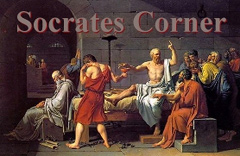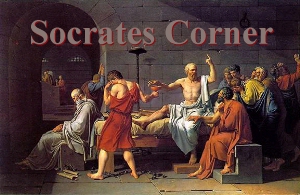On tyranny
*N.B.: This article is based in part on excerpts from Great Books of the Western World, Vol. 3: The Great Ideas – A Syntopicon, Chp. 95: Tyranny, Mortimer J. Adler, Editor in Chief and Vol. 5 – Aeschylus, Sophocles, Euripides, Aristophanes
Again, where the people are absolute rulers of the land, they rejoice in having the openness and exuberance of youth, while a tyrant counts this a danger, and seeks to slay or silence those possessed of spirit, while the discreet fear his power and violence.
~Euripides, The Suppliants
The world is in an existential state of chaos and war where tyranny is aggressively on the ascendancy – whether you refer to Assad’s brutal terror in the Syrian War, or that Iran virtually has its own nuclear bomb it promised “to wipe Israel off the map,” the reemergence of Al-Qaeda in Iraq and the Taliban in Afghanistan, or the failed policy of “Arab Spring” which gave us the military dictatorship in Egypt that ousted the Western-friendly dictator Hosni Mubarak, or the neo-Stalinism of Russia’s Putin who the annexed the Crimea without firing a shot. Now with his eyes on eastern Ukraine and doubtlessly reacquiring most if not all of the so-called “Baltic States” of the old Soviet Union – Poland, Estonia, Latvia, Lithuania, Moldova, Georgia, Ukraine, etc., will America and NATO who are under treaty to defend these nations if invaded by any aggressor nation, do so?
Are these examples of geopolitical tyranny?
Let us bring it closer to home, is the presidency of Barack Obama the very essence of tyranny with his frequent issuances of unconstitutional executive orders or his legions of shadow government “Czars” who rule in secret without oversight or knowledge by Congress nor legal checks and balances by the courts. For example, Obama’s Car Czar, Ron Bloom, once said that “the free market is nonsense” and “We kind of agree with Mao, that political power comes largely from the barrel of a gun.” As a point of historical reference according to the peer-reviewed research of R.J. Rummel, communists like Mao, Stalin, Lenin, Pol Pot, and other genocidal mass murders killed over 260,000,000 people in the twentieth century alone… in the name of an idea – atheism.
Therefore, if Obama and his legions of bureaucratic Brownshirts have such a revolting, genocidal view of life and history of the past, just think how insignificant you are in his eyes and in the eyes of his Czars if you get in the way of his grand, utopian/dystopian vision for America. Remember Obama’s campaign promise uttered just 5 days before becoming president, “… we will fundamentally transform America [into a European-style Socialist State]. Obama purposely left that last part out lest he reveal his overt plans of universal tyranny to even the low information voters out there.
It appears beyond a reasonable doubt that tyranny is the vilest corruption of government – a malicious abuse of power and a malevolent exploitation of the human spirit and human beings who are enslaved to it. Aristotle’s statement that “no freeman, if he can escape from it, will endure such government.” Totalitarianism is self-evident to all who, cherishing liberty and despising slavery, regard tyranny as always destroying the one and establishing the other.
Continuing our survey of the Great Books of the Western World brings us now to vol. 5 containing the works of the immortal ancient Greek playwrights – Aeschylus, Sophocles, Euripides and Aristophanes. In works by Aeschylus (525/24-456/55) such as the Oresteia, Oedipus Tyrannus, and his most noted opus, Prometheus Bound, writer David Cohen seems to echo the view of other writers’ historical view of the old school playwright Aeschylus as “the prophet of Zeus.” Moreover, in his work “The Theodicy of Aeschylus…” Cohen reveals the true nature of Zeus at the beginning, “I will first discuss the main traditional views concerning Aeschylus’ presentation of what is commonly called the Justice of Zeus, and then try to demonstrate that, in reality, Aeschylus portrays a cosmic and political order which is neither moral nor just, but rather tyrannical, in the sense that its ultimate foundations are force and fear.”
Later in Sophocles’ (497/96-406/05) Antigone, we see the twin weapons of the tyrant – force and fear – as demonstrated by King Creon, yet it is Creon’s son Haemon who first points out to the King of Thebes that he is acting tyrannically. Haemon argues that all of Thebes believes it is unjust for Antigone to die in such a terrible way for such a noble deed of giving a hero a hero’s burial against the king’s capricious decree forbidding the same. Creon, like the tyrant he is, then asks his son, “The city will tell me how I ought to rule it?” followed by the equally tyrannical, rhetorical question, “Isn’t the city thought to be her ruler’s?” (745, 749). In both occurrences, Haemon answers that his father is behaving unwisely and that “this city does not belong to one man!” (748). For a wise man would understand that the city of Thebes was not meant to be governed by a tyrannical ruler; rather, the ruler should listen to the city’s desires and needs. Sophocles’ meaning here is to affirm that it is a tyrannical ruler who believes no law stands above his own, ‘not even the gods.’ “Knowledge truly is by far the most important part of happiness, but one must neglect nothing that the gods demand” (1348-50). Hence, Sophocles is indeed emphasizing the point that a ruler must take all things under contemplation when leading, even religion, as man’s laws are surely not the highest laws.
The subjects of tyranny, tyrants, and their demonic abuse of the law is eloquently unveiled in this passage from Euripides’s The Suppliants, lines 429-40:
- Nothing does more harm to the state than a tyrant; when he rules, equal application of law comes to an end, the one man is tyrant, and he keeps unto himself and in secrecy the law, and so perishes justice. But when the laws are written down, rich and poor alike have equal justice, and it is open to the weaker to use the same language to the prosperous when he is reviled by him, and the weaker prevails over the stronger if he have justice on his side. Freedom’s mark is also seen in this: “Let any man possessed of wisdom give counsel to the state.” And he who comes forward and counsels well, gains renown, while he, who has no wish, holds his silence. What greater equality can there be in a state? Again, where the people are absolute rulers of the land, they rejoice in having the openness and exuberance of youth, while a tyrant counts this a danger, and seeks to slay or silence those possessed of spirit, while the discreet fear his power and violence.
Moses Hadas, in the introduction to his 2006 book, Ten Plays by Euripides, wrote an elegant synopsis of this genius’s work – Euripides was “the creator of…that cage which is the theatre of Shakespeare’s Othello, Racine’s Phèdre, of Ibsen and Strindberg,” in which “…imprisoned men and women destroy each other by the intensity of their loves and hates,” and yet he was also the literary ancestor of comic dramatists as diverse as Menander and George Bernard Shaw.
Finally, it is in Aristophanes Birds that we find the theme of tyranny once again but in an inconspicuous form. The protagonist of Birds arises from nothing to become a tyrannos of two men, Peisetairos and Euelpides (a forecast of the would-be progenitors of ancient Rome – Romulus and Remus). These men are weary of the checks and balances of Democracy instead long for tyranny of which they rule unhindered by the whims of the people, or the strictures of the rule of law. It is Peisetairos’s impressive political gifts that make him the obvious man of action for absolute rule, yet does his treatment of his subjects mark him as guilty of arrogance and treachery? – Aristophanes does not condemn him. Nor, however, does he praise Peisetairos’s rule. Therefore, if a birdlike population is to have a kingdom, must they of necessity also accept a tyrant like Peisetairos? – A man who as the supreme master, rules over his subjects as slaves in the way he imagines to be most advantageous for himself.
It was King Solomon in the Old Testament Book of Ecclesiastes where these two great aphorisms that to me seem tangentially related to the issue of tyranny – 1) “There is nothing new under the sun;” 2) “Vanity of vanities. All is vanity saith the Preacher.” In our brief survey of the writings of these four ancient Greek playwrights going back over 2,500 years we see that the same intractable human nature, the same hardness of men’s hearts leads to the same desire to seize absolute power; to be like the gods (demigods) and those forms of despotic rule (which isn’t something new) always leads mankind into tyranny and the establishment of the ultimate vanity of vanities – the master/slave relationship.
We see this tragic refrain repeated over and over throughout history under different names – Despotism, Slavery, Tribalism, Democracy, Paganism, Theocracy, Aristocracy, Oligarchy, Monarchy, Gnosticism, Secularism, Liberalism, Jacobinism, Evolution Atheism, Marxism, Communism, Socialism, Will to Power, Progressivism, Banana Republic, Democratic Socialism, Nazism, Nihilism, Fascism, Anarchy, Mob Rule – it’s all tyranny and all of these methods of government only leads to despair, poverty of mind, body, spirit, degradation, and death of the people. Hobbes used these words: “Whenever [Natural] law ends, tyranny begins, if the law be transgressed to another’s harm.” Tyrants never willingly cede power to the people or to the slave for Aristotle said that “the tyrant must be careful … to keep power enough to rule over his subjects, whether they like him or not, for if he once gives this up he gives up his tyranny.”
Outraged and disgusted by the manipulative tactics of despotic power, Sophocles’ Antigone refuses to surrender: “I will not be moderate. I will not be satisfied with the bit of cake you offer me if I promise to be a good little girl.” Antigone says no to King Creon and his tyrannical worldview. She demands to live life on her own terms or she will embrace death as a heroic martyr to be remembered as today … celebrated through the Ages. Thus, the Antigone/Creon battle of good vs. evil reminds me of the words of philosopher Soren Kierkegaard, “The tyrant dies and his rule is over, the martyr dies and his rule begins.”
If tyranny is anything it is the systematic institution of force and fear to enslave humanity, yet “the rebellion to tyranny,” Jefferson says, “is obedience to God.”
Book Notice
It’s been 5 years since publishing my last book and now I’ve published two new volumes – THE PROGRESSIVE REVOLUTION (University Press of America, 2013):
Vol. 1 @ https://rowman.com/ISBN/9780761861102
Vol. 2 @ https://rowman.com/ISBN/9780761861126
However, before the book is officially released to the public I have to place 100 pre-publication orders (50 orders per each volume). I need your help to make this happen ASAP. Please place your order today for volumes 1 & 2. Of course if you can order all 100 copies today, the book will become official tomorrow.
Please circulate this flyer to all your email contacts & Facebook/Twitter followers who may be interested in reading this opus. Thanks in advance to all my friends, associates and colleagues for your valuable support!
Invitation for manuscripts
I am starting a new a program on my blog dedicated to giving young conservatives (ages 14-35) a regular place to display and publish their ideas called Socrates Corner. If you know of any young person who wants to publish their ideas on any subject, have them send their essay manuscripts to my email at ewashington@wnd.com .
© Ellis Washington
Category: Commentary







